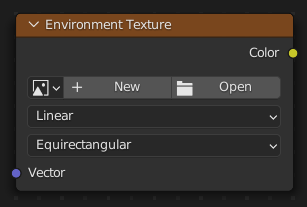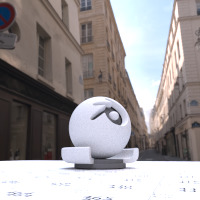Environment Texture Node¶

The Node Environmental Texture is used to light your scene using an environment map image file as a texture.
Inputs (Inputs)¶
- Vector (Vector)
Texture coordinate for texture look-up. If this socket is left unconnected, the image is mapped as environment with the Z axis as up.
Properties (Eigenschappen)¶
- Image (Afbeelding)
Image data-block used as the image source. Additional settings can be found in : These include options to control the alpha channel along with addition options for the color space. These addition options are documented with the rest of Common Image Settings.
- Color Space (Kleurruimte)
Type of data that the image contains, either Color or Non-Color Data. For most color textures the default of Color should be used, but in case of e.g. a bump or alpha map, the pixel values should be interpreted as Non-Color Data, to avoid doing any unwanted color space conversions.
De lijst met kleurruimten is afhankelijk van de actieve OCIO config. De standaard ondersteunde kleurruimten worden hier in detail beschreven: Default OpenColorIO Configuration
- Texture Interpolation
Interpolation method used for the environment texture. The following interpolations are available:
- Linear:
Regular quality interpolation.
- Closest (Dichtsbijzijnd):
No interpolation, use closest pixel.
- Cubic:
Smoother, better quality interpolation.
- Smart:
Bicubic when magnifying, otherwise Bilinear is used. This is only available for OSL.
- Projection Method
Allows you to use different types of environmental maps. The following methods are supported:
- Equirectangular:
Projection from an Equirectangular photo.
- Mirror Ball:
Projection from an orthographic photo or mirror ball.
Outputs (Outputs)¶
- Color (Kleur)
RGB color from the image.
Examples (Voorbeelden)¶

HDR image from OpenFootage.net.¶